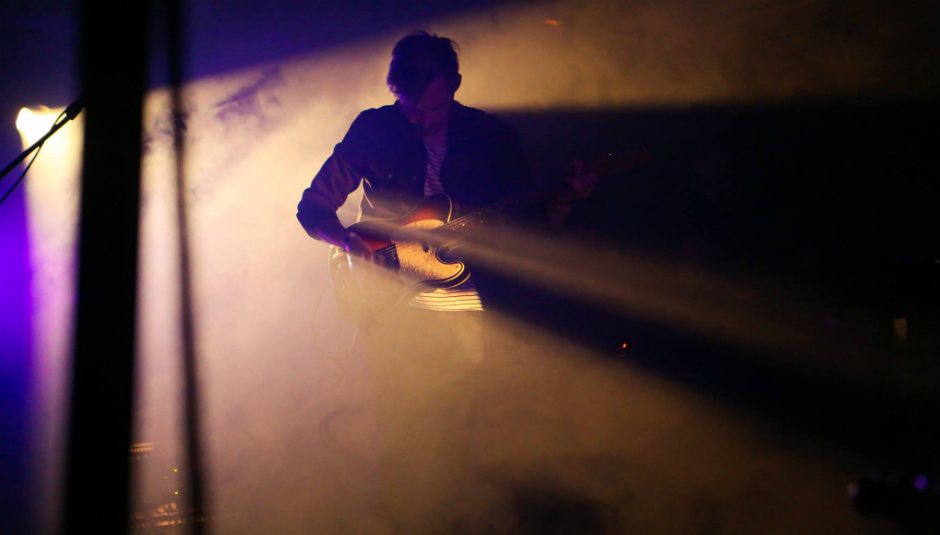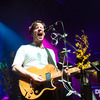There is, by now, not much left to say about Brexit. The die has been cast, our fate all but sealed. The UK will leave a union designed to foster peace and harmony across a continent that historically has enjoyed little of either. I think of this passing through the EU lane of passport control, and how soon I’ll have to give up the trusting, cursory glance by bored officials for the scrutiny and suspicion of the longer line to my left. It’s also on my mind as I shuffle around the foyer of Kino Šiška, the venue for the opening night of MENT, as the networking and greetings begin in earnest. I hear snippets of French, Polish, and various Eastern European languages; people mingle, talk music, and everyone sounds thoroughly enthused. As the concerts get underway, we’re treated to the passionate power-pop of Norway’s Sauropod, as infectious as it is fun, before people pile upstairs for Tommy Cash, apparently Estonia’s biggest act, a gonzo rapper whose dark, claustrophobic beats are complemented by some fancy footwork and woozy vocals. But best of all are local loons Leni Kravac, who earned their slot by turning up uninvited last year and playing a guerrilla gig in front of the venue, etiquette be damned. They’re certainly not short of bravado; their set features banners, communal shots, and glitter cannons, and while most of their songs are brash, good-time Balkan gypsy-punk, they manage to shoehorn in a bizarre cover of ‘My Sharona’ and the most batshit version of The Prodigy’s ‘Smack My Bitch Up’ you’re ever likely to hear. It’s madness, yet utterly joyful, the type of scene to give succour to those who still have faith in the European project and a belief that really, deep down, we’re really not all that different.
MENT, held in the capital of Slovenia, Ljubljana, is one of a growing number of small yet influential European festivals scheduled for the early part of the year. As much an industry event as one for international fans, there are numerous showcases and panels, and plenty of festival bookers in attendance, hoping to be impressed. There are receptions hosted by delegations from Poland, Austria, Hungary, and Belarus, with themed nibbles and plenty of promo CDs. Most seem to be funded in part by government art grants, specifically designed to garner some international recognition for their best and most popular acts. I spend some time with Dmitri Bezkoroainyi, a Belarusian delegate, who’s keen for me to come watch Awlnight, a producer and beat maker he thinks has a real chance of international success. There’s a lot to like about his laid-back retro creations – think Washed Out after a summer Djing at Ibiza’s Café del Mar – and the packed crowd in Channel Zero the following night are certainly enthusiastic, even if, by modern standards, it all seems a little unoriginal.
And therein lies the rub. It’s all too easy to pontificate about European bands and scenes from a UK vantage point and an industry that too often values novelty and invention over good old-fashioned song craft. While artists like HMLTD, Mura Masa, or Tei Shi are (rightly) garnering acclaim and cover features by the bucket load, to simply dismiss continental acts because they fall short of various pre-conceive notions of sophistication is to be guilty of the same kind of cultural elitism and snobbish superiority displayed by Brexiteers. So what if local heroes Haiku Garden are steeped in early Ride, Slowdive, and My Bloody Valentine? Some of their songs are short, sharp blasts, others are allowed to meander, but they all have a certain swagger and confidence; the waves of noise ebb and flow, their cult status round these parts not hard to fathom. It’s a similar story with Slovak band The Ills, whom I first discovered at last year’s Pohoda Festival. Nominally an instrumental post-rock band, they blend elements of metal, prog, and shoegaze (again) in a way that has casual listeners immediately thinking: “Mogwai” It’s an apt comparison, but there’s also more than a little Explosions In The Sky about they way they break out gentle, ethereal moments amid the maelstrom. Beautifully paced, their muscular music has an Eastern soul all of its own; one listen is all it takes to convince that these are no lazy copyists.
There is also joy in the unknown and the unique, and the beauty of festivals like MENT lies in the programming risks they are willing to take that similar UK festivals simply are not. Take Širom, a much talked about Slovenian trio that many delegates urge me not to miss. In the dark, cavernous Stara Elektrarna, their sprawling stage setup – which includes banjos, homemade kalimbas, ukuleles, various drums and tambourines, and balafons – is described by a colleague as a bit “drum circle for Corbyn”, and he has a point. But any notion that this might be 45 minutes of hippy, chin-stroking indulgence are soon swept away by their swaying, hypnotic rhythms and the quality of their musicianship. Switching from beat-led songs to more sparse affairs, their music has a mystical, pagan quality, a kind of pre-history folk, and the way they combine such ancient instruments with tribal elements stirs something primal deep in the soul.
At the other end of the spectrum is the defiantly experimental, and those artists pushing at the boundaries. We cram into Gala Hala on Friday for Oligarkh, a band who, and I quote, combine “the distinctive Orthodox tradition and dystopian realities of modern Russia in a spectacular audio-visual collision of Orthodox choirs, trap, Russian folk, hip hop, and bass music”. It’s certainly a spectacle; ear-bleedingly loud, and replete with retina-searing visuals, the trio attack their various instruments and black boxes with gusto, seemingly intent on ripping up the dancefloor and pulverising everyone into submission. There’s also Lifecutter, another local whose twisted, experimental drone-techno is every bit as intense and unsettling as you’d expect from an artist who titled their debut album Death(c)rave. Close your eyes, and it’s easy to imagine being trapped in an android’s nightmare as the Matrix disintegrates around you, the witching hour a perfect setting for Domen Učakar’s dark art.
For the delegates and invitees, MENT is not all late nights full of raucous tunes and lashings of Laško; there’s some serious work to be done. Two days of workshops and panels seem to be geared towards smaller and newer artists gaining a foothold in Western markets and sidestepping common industry pitfalls. There’s “How To Be A Rock Star On Social Media”, back-to-back panels about the ins and outs of sync and music placement, the deliciously titled “My PR-ecious Connections”, and a workshop to help “Plan Your Band’s Career”. Inclusive and helpful, the pervading spirit is very much one for all and all for one; while some of the advice on offer borders on basic common sense, it’s all given in good grace, and taken with open minds and the type of optimism that keeps large parts of the music industry alive. People nod, take notes, and ask pertinent questions; during the PR panel, one delegate commandeers the microphone to address the audience about what he perceives to be everyone’s failings when it comes to email etiquette, a subject that most music journalists – myself included – could probably write a book on.
DiS is lucky enough to be playing host as well, “Optimizing A Festival Line-up” being our chosen specialised subject, and the hour provides interesting insights into the practical realities of putting on events in 2017. The panellists highlight the importance of giving local artists a platform, how much festivals now have to focus on the “experience” as much as the music, and the somewhat worrying trend of bigger acts and their management demanding to know exactly who else you’ve booked, the precise time they’ll be playing, and who they’ll be up against before putting pen to paper. It’s also made clear just how much effort is expended to make events, including smaller ones like MENT, a success, and how quickly minor issues can snowball into something more serious.
Sadly, a much-touted keynote interview with Sub Pop Records founder Jonathan Poneman has to be rescheduled due to an untimely illness. Unable to fly, what was originally billed as the start of the day’s events ends up at the opposite end of Friday, the 5pm start for the Skype conversation the result of the time difference between here and Seattle. It’s a headache for the organisers, not least because the new time overlaps with a special reception in a hip downtown art gallery, where delegates have been invited to “Meet the Mayor”. More than one person I speak to is torn; no-one wants to miss the interview, but the lure of mingling with local dignitaries and sampling some of the region’s food and wine proves strong.
We gather in the DobraVaga Gallery, on the banks of the Ljubljanica river, which is also hosting an exhibition of music posters by local artists specially commissioned for the festival. Mayor Zoran Janković is indeed in attendance, and working the room like a pro. A successful businessman turned politician, he has the easy charm and disarming smile of someone who’s adept at playing the game; he’s the first mayor of the city to have served two terms since the end of World War II. A friend, a local, tells me he’s been implicated in various corruption scandals during his time, but that this seems not to have affected his popularity, each accusation actually bringing a jump in his approval ratings. Having been fed and watered, we admire the quality of the posters on display, many delegates choosing to purchase a few. Eventually, the dignitaries slip away, the party winds down, and we head out into the night for more music.
As good as the general program is – and it really is excellent – several bands stand out as being exceptional. I’d been told to expect mayhem from Belgium’s Raketkanon, but almost nothing can prepare you for the full on aural assault and madness the group serves up. Riffs as thick as sludge, and a malevolence buried deep into their strange, monolithic music make their show the most immersive and blistering of the entire festival. And God forbid anyone fails to devote as much focus to watching as the band does to their performance. I try to take a quick photo, for posterity; singer Pieter-Paul Devos leaps off stage, banishes my phone to underneath the keyboards, and lectures me about living in the moment and the “shit Instagram life”. “Are you pissed off? You look pissed off” he asks before launching into yet another blitzkrieg of noise and torrent of screams. The drummer, grinning manically, retrieves the device at the end with a “What do you expect?” shrug; come for the tunes, stay for the madness. You’ve been Raketkanoned.
There’s beauty on the softer side too, as both Italy’s Birthh and Poland’s Coals ably demonstrate. Both deal in dreamy, ethereal pop, with elements of electronica and folk music mixed into their lush, quiet soundscapes. The latter are more spectral, with haunting melodies so fragile they might shatter into a thousand pieces, all laid over gentle beats, while the former, twenty-year-old Alice Bisi, sounds old before her time, drawing on greater drama and introspection for her moody tales. Both are operating in a crowded space – artists like Banks, SOHN, and Tove Lo have long made glacial, alternative R&B and downtempo synth-pop fashionable – yet Birthh and Coals have the tunes to carve out their own space and succeed on their own terms (Bisi headed to this year’s SXSW, and was rapturously received).
But the absolute highlight, and proof of the underground’s rude health if you know where to look, came courtesy of two Dutch bands, The Homesick and The Sweet Release Of Death. Alternative guitar pop music is currently a much-maligned genre, but both bands rip through their respective sets with an urgency that borders on the manic, providing a riposte to those convinced of this scene’s moribund status. The Homesick, looking like they’d wandered in from some local council estate, have a vaguely menacing air, their music carrying a lot of weirdness and hints of Factory bands of yore. It’s dark, but not overly so, songs chugging along but never falling into full blown, Fat White Family style chaos. Rotterdam’s The Sweet Release Of Death are no less visceral, and have a harder edge; some of their tracks collapse into a cacophony of noise, singer and bassist Alicia Breton Ferrer stoically looking on as Sven Engelsman and Martijn Tevel attack their instruments with a righteous fury. “A proto-Gothic noise act” the Quietus called them, and it’s an apt description; they have texture and swagger in spades, and an uncanny knack of knowing precisely when to floor the accelerator and when not to. Of course, you’ve probably not heard of either band, but on this form that will surely change over the coming years; bigger things await them. Much like MENT itself I’d have thought.
MENT 2018 takes place from the 31 Jan to 2 Feb 2018. For more information and tickets, please visit the festival's official website.
Photo credit: Kaja Brezočnik






















